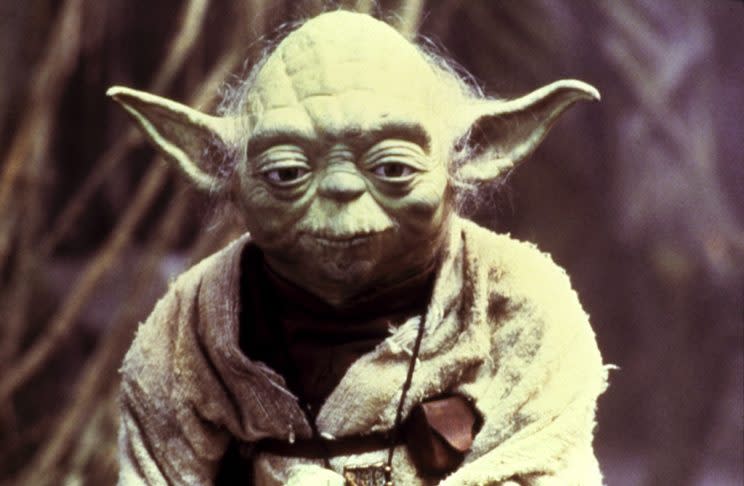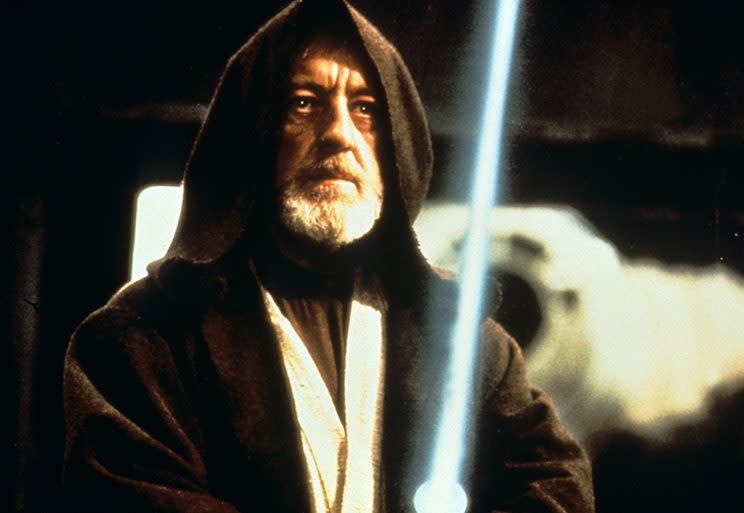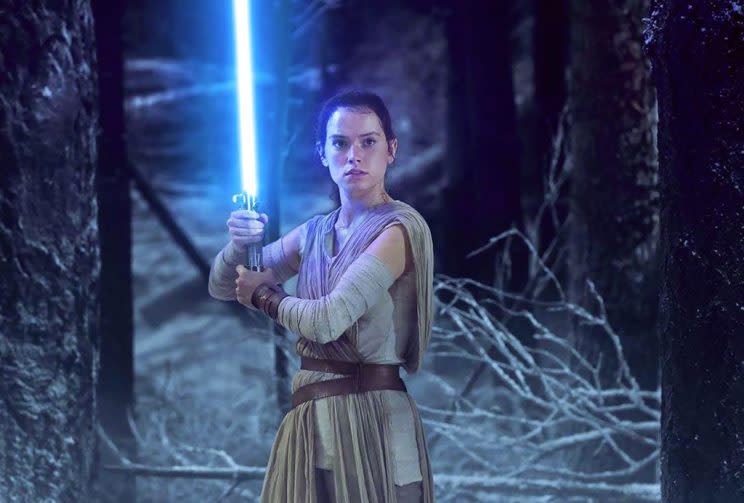The Religion of 'Star Wars': Why People of All Faiths Embrace the Force

A lifelong Star Wars fan from California, Irfan Rydhan always saw echoes of his Muslim faith in the concept of the Force. But when he began researching the parallels between Star Wars and Islam for a blog post, he was surprised to find a traditional Sufi figure that reminded him of Yoda. “Al-Khidr is described as a green being who is very knowledgeable,” Rydhan, a project manager in the design and construction industry, tells Yahoo Movies. “And obviously that kind of translated for me into Yoda, who’s a green creature who guides someone into the right path.”
Rydhan isn’t the only person of faith to wonder if Yoda has roots in his or her own religious tradition. Jewish Star Wars fans have noted that the name of Luke Skywalker’s mentor sounds like the Hebrew terms yada, meaning “to know,” and yo-dei-ah, the original term for “Jew.” Some Taoists believe that Yoda’s age in Return of the Jedi (“When 900 years old you reach, look as good you will not!”) is a nod to their belief that humans can live 800 years or more, like the Taoist saint Peng Zu. One Buddhism scholar claims that Yoda was actually modeled after a Tibetan Buddhist monk named Tsenzhab Serkong Rinpoche. And when The Empire Strikes Back opened in Utah theaters in 1980, many Mormons were convinced that Yoda was based on lookalike Spencer W. Kimball, the then-president of the Church of Jesus Christ of Latter-day Saints.
It’s not just Yoda. Ever since the first Star Wars movie opened 40 years ago on May 25, 1977, people from all different faiths have been excited to find parallels to their own beliefs and traditions in the sci-fi saga, both in its larger themes about the all-powerful Force and in specific details of the Skywalker saga. With all the ideological divisions and disagreements that exist between followers of different religions, how is it that Star Wars resonates with so many? The answer lies in creator George Lucas’s vision of his saga as a “mono-myth”: a story with broad themes and characters that would have echoes in nearly every belief system. Yahoo Movies spoke with several faith leaders, religion scholars, and adherents of different religions, all of them Star Wars fans, to get some perspective on how the Skywalker legend can be a source of divine inspiration.

The Star Wars films chronicle the interplanetary battle between the scrappy, good-hearted Rebels and the sleek, power-hungry Empire. Original protagonist Luke Skywalker rises from naïve farm boy to despot-overthrowing hero when he learns the ways of the Jedi, an ancient order of warriors who harness a spiritual energy called the Force. “In terms of ideology, Star Wars is this beautiful milkshake, like a slurry of different religious ideas all mixed together,” says Ryan Overbey, visiting assistant professor of religion at Wesleyan University.
That Star Wars recipe was concocted by Lucas, who was raised Methodist but harbored a lifelong fascination with different cultures’ ideas of God. “I remember when I was 10 years old, I asked my mother, ‘If there’s only one God, why are there so many religions?’” Lucas told Time magazine in 1999. “I’ve been pondering that question ever since, and the conclusion I’ve come to is that all the religions are true.” That idea was reinforced for Lucas by the writings of mythologist Joseph Campbell, who theorized that all mythic narratives, including the stories of Christ and Buddha, were variations on the same universal story: the “hero’s journey.”
Lucas made an effort to model his Star Wars films on Campbell’s formula, “telling an old myth in a new way,” as he described it to Time magazine. Along with the broader story about the struggle between good and evil, the writer-director borrowed specific elements from a grab bag of myths and religions. For example: “Jedi” sounds like the Sufi term for “master of the mystic-warrior way,” the Arabic word Al-Jeddi. According to producer Gary Kurtz, the Jedi blessing “May the force be with you” is modeled on the Christian liturgical phrase “The Lord be with you.” Darth Vader’s invitation to Luke to join him on the dark side is evocative of the temptations of Jesus Christ and Buddha. Part of the Ewok language from Return of the Jedi is a Tibetan Buddhist prayer.
More important, Lucas invented a new concept of the divine for his Star Wars saga: the Force, the centerpiece of the Jedi. “I put the Force into the movie in order to try to awaken a certain kind of spirituality in young people — more a belief in God than a belief in any particular religious system,” Lucas told Time. The Force is described by Obi-Wan Kenobi in A New Hope as the source of a Jedi’s power, “the energy field created by all living things” that “binds the galaxy together.” In The Empire Strikes Back, we learn that the Force has a light and a dark side. It’s all deliberately vague, yet specific enough to apply to the idea of God in every major world religion. That’s where Rydhan first saw parallels to Islam. “Our concept of God is kind of similar to the Force in terms of, we don’t believe that God has any human image or form that humans understand,” he explains.

For the increasing number of people who are raised without organized religion — many of whom have probably seen a Star Wars movie — the Force can open the door to understanding complex religious concepts. “When I teach religion, the Force is actually a good way to begin talking about things like Taoism or monism in Hinduism,” says Joseph Laycock, assistant professor of religious studies at Texas State University. Pastor Ben Larson-Wolbrink of the First Presbyterian Church of Beacon, N.Y., has used the Force in religious instruction as a way to “try to move beyond this idea of [God as] a guy on a throne on a cloud with a beard.”
It’s not just about using pop culture to make religion accessible; there are deeper theological ideas to be found in the Force as well. Rabbi Brent Spodek of the Beacon Hebrew Alliance sees the Force as a way to look past simple concepts of good and evil into the more nuanced understanding put forth by Jewish Rabbinical literature. “Darth Vader is Luke’s father, and Kylo Ren is Han Solo and Princess Leia’s son,” Spodek says. “The dark side, the shadow side, isn’t out there somewhere; it’s in here… In Hebrew it’s your yetzer hara, your own appetites, unchecked. All of the things we might think of as wrong are in many ways questions of moderation or control. Luke Skywalker’s like, ‘I need to learn how to fight, I want to defeat Vader.’ Of course, he wants to be powerful and mighty strong. And there’s nothing wrong with that. But that desire to be strong, that desire to be mighty, unchecked, is what leads you to be Vader.”
Such big ideas about human existence rarely come up in discussions of other pop-culture juggernauts. What is it about Star Wars that sparks these conversations? For one thing, the Star Wars films have a religious belief system built into the story, something that sets them apart from the secular-humanist Star Trek or the Marvel and D.C. movies, in which “gods” are just extra-powerful superheroes. As to why people of so many different faiths can comfortably align themselves with Lucas’s belief system, it has a lot to do with the fact that Lucas based it in religious ideas, rather than any specific practice.
“The Force and the Jedi Order and all of that are already a couple of degrees of separation from actual religious life as people experience it,” says Michael Norton, assistant professor of philosophy at the University of Arkansas at Little Rock. “So I think it’s easy for audiences to take that and fill in the gaps with their own experiences.” Laycock, who teaches Star Wars in his Religion and Film and World Religion courses, points out that the Force transcends cultural differences that inevitably exist in real-world religions. “There don’t really seem to be different denominations of Jediism or anything,” he notes. “It’s all just the Force — you either feel it or you don’t. Like, different planets don’t experience the Force differently because of their cultures or languages — everybody just gets it!”

In this sense, Jediism can been seen as an idealized version of religion, uncorrupted by historical divisions. It’s little wonder that some Star Wars fans have been inspired to claim Lucas’s invented faith as their own. A 2017 New York Times article about the small-but-growing Jedi religion estimates that the number of serious practitioners in England alone is around 2,000. Of course, bringing Jediism into the real world creates those real-world divisions absent in the films; for example, the independent Jedi organizations, the Temple of the Jedi order, and the Church of Jediism have conflicting belief systems.
Even if Jediism fails to thrive outside of Lucas’s galaxy, the Force will continue to be a touchstone for Star Wars fans of many faiths. The films might even be moving toward a deeper exploration of their own religious ideas. Rogue One introduced a new kind of Force follower in Chirrut Îmwe, a warrior-monk who commits himself to Jedi principles without actually being a Jedi. And Luke Skywalker’s declaration in the Last Jedi trailer that “it’s time for the Jedi to end,” while open to interpretation, might mean that traditional ways of using the Force will evolve and change with new heroine Rey.
As long as the films encourage audiences to go on their own spiritual quests, they’ll be keeping with Lucas’s original vision. As Lucas told Time about inventing the Force, “I wanted to make it so that young people would begin to ask questions about the mystery. Not having enough interest in the mysteries of life to ask the question ‘Is there a God or is there not a God?’ — that is for me the worst thing that can happen.”
Watch the trailer for Star Wars: The Last Jedi:
Read more from Yahoo Movies:


